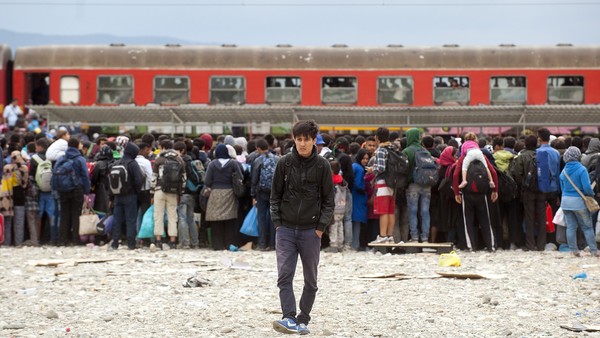EU leaders are weighing a drastic plan to staunch the influx of asylum-seekers by blocking their passage into Macedonia, stoking fears in Athens that tens of thousands of migrants will become stranded in Greece.
The move to ringfence Greece comes as fears grow that an EU scheme to get Turkey to block the flow of refugees entering the EU in exchange for €3bn in aid has failed to reduce the migrant flow.
On Friday, at least 43 migrants, including 17 children, drowned when their wooden sailboats sank off two Greek islands near Turkey.
The new policy would shift the EU’s migrant frontline from the Turkish coast and the Aegean Sea to Greece’s northern border. Alexis Tsipras, the Greek prime minister who has feared such a move, has warned that his country could become a “black box” for refugees.
The plan was discussed on Wednesday by EU ambassadors after Miroslav Cerar, Slovenia’s prime minister, sent a letter to his EU counterparts urging “direct assistance” to Macedonia to prevent “certain irregular migrants from crossing the Greece-Macedonian border”.
“All the EU countries should provide maximum assistance to the Macedonian authorities in controlling the mentioned border through secondment of police officers, provision of equipment and by other appropriate means,” he wrote.
The Commission dispatched a team of officials to the region this week to assess what personnel and equipment Macedonia would need to strengthen controls at the border with Greece.
Although the EU has provided Skopje with financial assistance in the past, officials said this would go would go farther than a previous plan to help the country process arrivals and stop “irregular migrants” at its border.
The EU is struggling to respond to a surge of desperate migrants that has resulted in thousands of deaths since the beginning of the year
Mujtaba Rahman, an analysis at Eurasia Group, the risk consultancy, said: “Pressure is building to ringfence Greece to keep refugees there, as other EU migration policies are failing. With this move Europe is essentially forcing Greece out of Schengen.”
The Slovenia plan is believed to have support in Berlin, while people briefed on the discussions said Donald Tusk, the European Council president, is also giving the idea consideration.
The migration crisis has taken on new urgency because of the failure of most previous measures agreed by the EU, including the Turkey agreement and a plan to create processing centres in Greece and Italy that could then relocate 160,000 refugees across the EU. So far, only 331 have been relocated.
Mr Tusk and other EU leaders have given themselves until March to come up with a new plan. Mark Rutte, the Dutch prime minister, warned this week that without an effective solution within the next six-to-eight weeks, the EU’s passport-free Schengen zone could collapse. Temporary border checks have already been introduced in Slovenia, Austria, Germany, Denmark and Sweden.
The de facto removal of Greece from the EU’s passport-free zone was raised last year after Athens proved unable to cope with the arrival by sea of more than 850,000 people.
Greece’s handling of the refugee crisis has frustrated both Berlin and Brussels. But Athens has repeatedly said it is unable to cope with the inflows of people, which have shown little sign of slowing. More than 35,000 people have landed in Greece this year alone, according to the United Nations High Commissioner For Refugees.
Blocking migrants at Macedonia’s southern border would be the most severe measure yet taken during the crisis. Refugees could in theory enter Macedonia to claim asylum there. But countries are not obliged to let people travel through in order to seek asylum elsewhere. The vast bulk of people passing through Greece into Macedonia are heading elsewhere, notably Germany.
The move would heap more pressure on Greece’s already failing asylum system, while potentially creating further legal problems. In 2011, the European Court of Human Rights warned that the Greek system was “degrading”. This decision effectively banned EU countries from transferring asylum seekers back to Greece if this was their first port of call, as demanded by EU rules.
![]()































